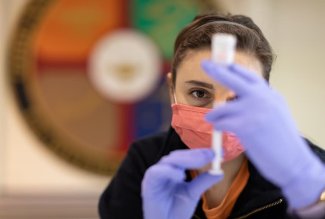
Ohio Northern University’s HealthWise Pharmacy and Mobile Clinic are preparing to offer pediatric COVID-19 vaccinations for children ages 5-11, pending CDC approval and deliveries of appropriate doses and supplies. Federal agencies have indicated the vaccines could be available as early as November.
“We’re 100 percent on board with this,” says College of Pharmacy Dean Steve Martin, Pharm.D.
Pharmacy faculty, staff and students expect to administer the vaccines on campus and through the Mobile Clinic. They’ve reached out to faculty and staff in ONU’s nursing program to develop training that teaches practical and physiological methods for how to best serve children in healthcare settings.
HealthWise Mobile Clinic had served as a state-sponsored COVID-19 vaccine clinic for the region, and the on-campus pharmacy continues to administer the vaccine, but those shots have primarily been given to adults. The federal government has indicated rollout of pediatric vaccines will be logistically different than the mass vaccination clinic approach that was organized in the spring.
Rationale
The reasons for getting children vaccinated are clear, according to Martin. Along with offering additional scientifically proven protection for themselves and the public from COVID-19, the virus “is the biggest threat to kids” right now, he says.
“The risk of getting Covid is actually pretty high, and even if they survive it, there could be long-term health consequences,” Martin maintains. “For kids, the risk of getting sick is not much different than it was a year ago. If we can get the bulk of kids vaccinated, we’ll all be living in a much safer environment.”
Martin also points out that most of Ohio “is still in the red” regarding transmission rates. Hardin County has only a 39.7% vaccination rate, according to Ohio’s COVID-19 dashboard.
The state dashboard also indicates that as of Oct. 26, there have been 202,065 reported cases (representing 13% of total cases) of COVID-19 in children under age 18, with 2,013 hospitalizations and 12 deaths.
Nationwide, the most recent studies have shown children’s rates of infection “can be comparable, and in some settings higher than adults,” according to the CDC. Children are less likely to develop severe illness or die from COVID-19 but are just as likely as adults to pass it along to others. Also, children are more commonly asymptomatic, or have mild, non-specific symptoms, which means they can be infected and not know it and are therefore more likely to infect others.
The American Academy of Pediatrics reports that, since the pandemic began, children under 18 represented 16.5% of total accumulated cases. “For the week ending Oct. 21, children were 25.1% of reported weekly COVID-19 cases (children, under age 18, make up 22.2% of the U.S. population),” it says.
While Ohio Governor Mike DeWine is a strong advocate of mask policies, many K-12 schools, childcare centers and other places where children congregate have not done so. Infections in many communities have necessitated quarantining of numerous students, staff members and their families.
“The evidence that children and adolescents can be infected with, get sick from, and transmit SARS-CoV-2 continues to evolve,” states the CDC, especially as new variants impact the population.
Prep Work
Receiving a vaccination can be scary, especially for kids. While acknowledging there is no one-size-fits-all solution, Martin and Michael Rush, Pharm.D., assistant clinical professor and HealthWise director, offer the following tips that caregivers can keep in mind to help prepare their child for the COVID-19 vaccine:
• Emphasize the safety and altruistic aspects of getting the shot. Knowing that they’ll be helping themselves and helping others—especially those they know who are more at risk of getting the virus—may ease their anxiety. This is also “how they can play their part in helping the world,” Martin says.
• Consider how a child may respond to detailed information offered in advance. For instance, Rush’s two children are entirely different—one prefers knowing ahead of time when they’re going to get a shot, while another would rather have it sprung on them to avoid prolonged worrying.
• If they ask, address the pain factor. As with other vaccines, pediatric COVID-19 shots will be administered with needles that are thinner and shorter than those typically used for adults. “The diameter is very small,” says Martin. “Most people don’t feel it.”
• Remind them that a COVID-19 vaccine is simply an additional preventative health measure, just like vaccines they receive for other diseases such as measles, chicken pox and polio.
• Rush suggests using the Swiss cheese model to explain the multifaceted approach that those around the world are taking to prevent them from getting COVID-19. Each approach is good, but not full proof. Therefore, multiple methods, such as mask wearing, social distancing, hand washing and vaccination, will provide the best protection, he says.
• Given the greater health protection that the vaccine affords, some caregivers may want to talk to children about whether they can resume fun activities such as contact sports.
During the Shot
• For younger children in particular, Martin and Rush said distractions can help while the vaccine is being administered. Not seeing the needle could mean the difference between a calm child and a combative one. Singing, a favorite stuffed animal or treat can be used to divert their attention. There will likely be suckers on hand for ONU pediatric vaccinations, Martin said.
• Hugs, hand holding, other comfort methods and praise from caregivers are essential.
As ONU’s HealthWise Pharmacy and Mobile Clinic gear up to provide COVID-19 vaccinations to children, they are currently administering COVID-19 booster shots for those who have already been vaccinated and are eligible under CDC guidelines. Seasonal flu shots are also being offered. Flu shots, boosters and initial single or two-dose COVID-19 vaccines of all three pharmaceutical brands are available at the campus pharmacy from 4-6 p.m. Monday through Friday. Walk-ins and scheduled appointments are welcome. To schedule an appointment, call the pharmacy at 419-772-3784. This story has more specifics.